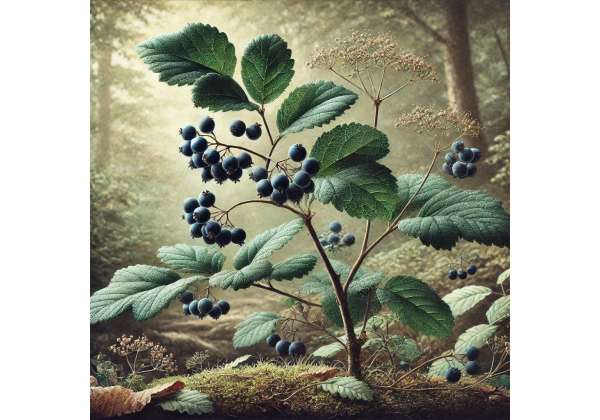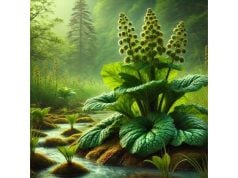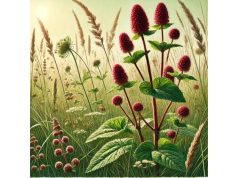
Black haw is a traditional herb known for its gentle yet effective support of women’s health, especially in addressing menstrual discomfort and supporting uterine health. This deciduous shrub, native to the woodlands of eastern North America, has been used for generations in folk medicine for its antispasmodic and anti-inflammatory properties. The herb’s name, “black haw,” is derived from the dark, almost black fruits that appear later in the season, and its historical reputation as a remedy for various female reproductive issues has made it a staple in many natural healing practices.
Historically, indigenous peoples and early settlers alike turned to black haw for relief from menstrual cramps, uterine pain, and other reproductive discomforts. Today, modern herbalists continue to value black haw for its potential to ease spasmodic contractions of the uterus and to support overall pelvic health. In addition to its well-known benefits for women, black haw is also appreciated for its calming, anti-inflammatory effects that may help soothe general muscle tension and support a balanced inflammatory response.
Its active compounds include a range of saponins, flavonoids, and other bioactive substances that work together to provide a multifaceted approach to wellness. While research on black haw is still emerging, many studies and centuries of anecdotal evidence suggest that this herb can be an effective natural remedy when used properly. From teas and tinctures to capsules and extracts, black haw is available in a variety of forms that make it easy to integrate into your daily routine.
- Supports uterine and menstrual health
- Helps alleviate menstrual cramps and spasms
- Provides anti-inflammatory and antispasmodic effects
- Promotes overall pelvic and reproductive well-being
- May help relieve general muscle tension
- Offers a gentle, natural approach to hormonal balance
- Supports relaxation and helps ease discomfort during menstrual cycles
Table of Contents
- Black Haw Botanical Overview: Identification and Characteristics
- Black Haw Historical Background: Traditional Uses and Cultural Roots
- Black Haw Phytochemical Profile: Active Compounds and Nutrient Insights
- Black Haw Health Benefits: Support for Menstrual and Uterine Health
- Black Haw Properties: Key Attributes and Therapeutic Potentials
- Black Haw Uses and Safety: Practical Applications and Precautions
- Black Haw Scientific Research: Studies, Evidence, and Future Directions
- Black Haw FAQs: Common Questions Answered
Black Haw Botanical Overview: Identification and Characteristics
Black haw (commonly known as Viburnum prunifolium) is a deciduous shrub that is part of the Adoxaceae family. Native to the woodlands and moist slopes of the eastern United States, this herb has been traditionally used by Native American tribes and early European settlers for its medicinal properties. Black haw typically grows to a height of 6 to 12 feet, forming a multi-stemmed shrub with arching branches, which in the fall are often adorned with a brilliant display of red and orange foliage.
Recognizing Black Haw
The identification of black haw in the wild is relatively straightforward if you know what to look for. The leaves are ovate to broadly lanceolate, with serrated margins and a glossy, dark green appearance during the growing season. In autumn, these leaves transform into a vibrant display of warm colors before falling away. The shrub produces clusters of small, white, slightly fragrant flowers in the spring, which give way to dark purple to nearly black fruits in late summer or early fall. These berries are the source of the herb’s name and contain many of the active compounds attributed to its medicinal properties.
Habitat and Growing Conditions
Black haw thrives in moist, well-drained soils and is commonly found in shaded or partially shaded areas such as woodland edges, riverbanks, and slopes. It prefers regions with moderate rainfall and can tolerate a range of soil pH levels. In its natural habitat, black haw plays an important ecological role by providing food for birds and other wildlife through its fruits. Gardeners and herbal enthusiasts alike appreciate black haw for its resilience, ease of cultivation, and its dual role as both an ornamental and medicinal plant.
Traditional Cultivation Practices
Historically, black haw was cultivated not only for its aesthetic appeal but also for its therapeutic uses. Traditional cultivation methods often involved selecting robust, healthy shrubs from the wild and propagating them through cuttings or seed sowing. Over time, these practices helped preserve the genetic integrity of the plant, ensuring that the concentration of its bioactive compounds remained high. Today, many herbal supplement companies source black haw from carefully managed organic farms that adhere to sustainable cultivation practices.
Ecological Benefits
Beyond its use in traditional medicine, black haw contributes to local ecosystems by attracting pollinators with its delicate flowers and providing a food source for wildlife with its fruits. This ecological significance underscores the importance of preserving native plant species like black haw, which not only support human health but also enhance biodiversity and environmental stability.
Understanding the botanical characteristics of black haw provides a solid foundation for appreciating its historical and contemporary uses. The plant’s unique appearance, resilience, and adaptability have made it a beloved herb among herbalists and natural health advocates for generations.
Black Haw Historical Background: Traditional Uses and Cultural Roots
The historical journey of black haw is steeped in rich cultural traditions and centuries of herbal wisdom. Indigenous peoples and early settlers in North America recognized black haw as a valuable remedy, particularly for women’s reproductive health. Its longstanding use in folk medicine is a testament to its efficacy and enduring appeal.
Traditional Uses in Native American Medicine
Native American tribes, especially those from the southeastern regions of the United States, were among the first to harness the healing properties of black haw. They used decoctions and infusions of black haw bark and twigs to alleviate menstrual cramps, regulate menstrual cycles, and support overall uterine health. These traditional preparations were often passed down through generations, forming an integral part of the cultural heritage related to women’s health. In some tribes, black haw was also believed to possess spiritual qualities, offering protection and promoting balance during times of transition.
Adoption by Early European Settlers
As European settlers arrived in North America, they quickly adopted the native herbal remedies provided by indigenous peoples. Black haw became a common ingredient in early American materia medica. Its use expanded beyond gynecological applications to include treatments for a variety of ailments such as gastrointestinal discomfort and joint pain. The herb’s antispasmodic and anti-inflammatory properties made it a versatile remedy, and it was often incorporated into herbal blends and tonics that were used to support overall health and vitality.
Evolution of Black Haw in Folk Medicine
Throughout the 18th and 19th centuries, black haw was a staple in many American households. Herbalists documented its benefits in numerous manuscripts and pharmacopeias, noting its effectiveness in easing menstrual pain, reducing uterine spasms, and aiding in childbirth recovery. Its reputation as a “women’s herb” grew, and it was commonly prescribed to support reproductive health and alleviate the discomforts associated with menstruation and menopause.
Cultural Symbolism and Modern Rediscovery
In addition to its practical uses, black haw has been imbued with cultural symbolism over the years. It came to represent the natural wisdom of the land and the intrinsic connection between women and nature. Today, as modern society shifts toward natural and holistic approaches to health, black haw is experiencing a resurgence in popularity. Many women now turn to this herb as a natural alternative to conventional hormonal therapies, valuing its gentle, supportive action on the reproductive system. The modern revival of black haw is driven by both a renewed interest in traditional remedies and a growing body of scientific research that supports its historical uses.
By bridging the gap between past and present, black haw offers a compelling example of how traditional herbal knowledge can inform and enhance contemporary wellness practices. Its historical roots provide a rich context for understanding its therapeutic potentials and its enduring relevance in natural medicine.
Black Haw Phytochemical Profile: Active Compounds and Nutrient Insights
The therapeutic power of black haw is largely attributed to its complex phytochemical composition. Modern research and traditional knowledge converge in the understanding that a rich blend of bioactive compounds underpins the herb’s beneficial effects, particularly in supporting women’s reproductive health.
Key Bioactive Compounds
Among the most significant constituents of black haw are various saponins, which are believed to have antispasmodic properties that help relax uterine muscles. These naturally occurring compounds may contribute to the herb’s ability to alleviate menstrual cramps and reduce uterine spasms. In addition to saponins, black haw contains flavonoids and phenolic compounds that provide strong antioxidant activity. These antioxidants help protect cells from oxidative damage, thereby supporting overall cellular health and reducing inflammation.
Other phytochemicals present in black haw include tannins, which may help in astringent and anti-inflammatory applications, and various volatile oils that contribute to its unique aroma and flavor profile. Although research on black haw’s exact chemical makeup is still ongoing, early studies have confirmed that the synergy among these compounds plays a crucial role in its therapeutic efficacy.
Nutrient Composition and Synergistic Effects
Beyond its bioactive compounds, black haw also contains trace amounts of vitamins and minerals that support general health. While it is not a primary source of macronutrients, its nutritional profile complements its pharmacological properties by contributing to overall wellness. The natural synergy between the active compounds and the inherent nutrients in black haw is one of the reasons why whole-herb preparations are often more effective than isolated extracts. This synergistic effect helps ensure that the benefits of black haw extend beyond simple symptom relief to promote balanced, holistic health.
Advances in Analytical Techniques
Modern analytical techniques such as high-performance liquid chromatography (HPLC) and mass spectrometry have allowed researchers to identify and quantify the various phytochemicals in black haw with precision. These techniques have confirmed the presence of several bioactive constituents and have paved the way for further research into how these compounds interact at the molecular level. The insights gained from these studies are helping to validate traditional uses and are opening new avenues for the development of standardized herbal supplements.
Implications for Therapeutic Use
Understanding the phytochemical profile of black haw provides a scientific basis for its traditional applications. The presence of antispasmodic saponins and potent antioxidants supports its long-standing use in easing menstrual discomfort and promoting uterine health. Moreover, the anti-inflammatory properties of its flavonoids and phenolic compounds have broader implications for reducing inflammation and supporting overall well-being. As research continues, the potential for black haw to be used in integrative health protocols is becoming increasingly clear, bridging the gap between traditional herbal wisdom and modern medical science.
Black Haw Health Benefits: Support for Menstrual and Uterine Health
Black haw is most celebrated for its role in supporting women’s reproductive health, though its benefits extend into other areas of wellness as well. Many users turn to black haw as a natural solution for menstrual discomfort, uterine spasms, and other symptoms associated with the menstrual cycle.
Alleviating Menstrual Cramps and Spasms
One of the hallmark benefits of black haw is its ability to relieve menstrual cramps. The herb’s antispasmodic properties help relax the smooth muscles of the uterus, reducing painful contractions that can occur during menstruation. Many traditional herbalists have recommended black haw as a gentle, natural alternative to over-the-counter pain relievers, particularly for women who experience chronic dysmenorrhea (painful periods).
Promoting Uterine Health
Black haw is also used to support overall uterine health. It is believed to help regulate the menstrual cycle and ease the symptoms of uterine tension. By reducing spasmodic contractions and alleviating discomfort, black haw contributes to a more balanced and less painful menstrual experience. This benefit is especially valued by women who seek natural ways to manage hormonal fluctuations without resorting to synthetic hormonal therapies.
Anti-Inflammatory and Analgesic Effects
In addition to its reproductive benefits, black haw’s anti-inflammatory properties help reduce general inflammation throughout the body. This can be particularly useful for managing conditions that involve inflammatory processes, such as certain types of arthritis or muscle tension. The mild analgesic (pain-relieving) effects of black haw further support its use in alleviating discomfort, making it a versatile herb in natural pain management.
Broader Wellness Support
Beyond its targeted effects on menstrual and uterine health, black haw may contribute to overall well-being. Its calming properties can help reduce stress and promote relaxation, which in turn can positively impact the menstrual cycle. Some users report experiencing improved mood and reduced anxiety when incorporating black haw into their wellness routine. The cumulative effects of its antispasmodic, anti-inflammatory, and calming properties make black haw a holistic support herb that promotes balance and vitality.
Integrating Black Haw into a Wellness Regimen
Black haw is available in a variety of forms, including teas, tinctures, capsules, and dried herbal preparations. Consistent use over time is often recommended to fully experience its benefits. Whether used as a daily supplement during the menstrual cycle or taken seasonally to support reproductive health, black haw offers a natural, non-invasive option for women seeking to improve their quality of life and manage discomfort with gentle herbal support.
Black Haw Properties: Key Attributes and Therapeutic Potentials
The therapeutic properties of black haw are derived from its unique chemical composition and the natural synergy of its bioactive compounds. Its distinct attributes not only make it a valuable herb for reproductive health but also lend it broader applications in natural medicine.
Antispasmodic and Relaxant Qualities
Black haw is most recognized for its antispasmodic properties. This means it can help relax smooth muscle tissue, particularly in the uterus, which is why it has traditionally been used to ease menstrual cramps and uterine spasms. These relaxant properties are attributed to specific saponins and other compounds within the herb that help modulate muscle contractions.
Anti-Inflammatory Effects
Chronic inflammation is a common underlying factor in many health conditions, and black haw’s anti-inflammatory capabilities are an important aspect of its therapeutic profile. The flavonoids and phenolic compounds present in black haw work to reduce inflammatory markers in the body, thereby helping to alleviate pain and discomfort associated with inflammation. This anti-inflammatory action further supports its use in managing both reproductive and musculoskeletal discomfort.
Antioxidant Protection
The antioxidants found in black haw help neutralize free radicals, which are unstable molecules that can damage cells and contribute to aging and disease. By providing antioxidant protection, black haw supports overall cellular health and may help reduce the oxidative stress that exacerbates inflammatory conditions. This property not only benefits reproductive health but also has implications for general well-being and longevity.
Calming and Mood-Enhancing Properties
In addition to its physical health benefits, black haw is known for its mild calming effects. By reducing muscle tension and promoting relaxation, it may help ease stress and improve mood. This is particularly beneficial during periods of hormonal fluctuation when stress and anxiety can worsen physical symptoms. The overall sense of calm provided by black haw can contribute to a more balanced state of mind, which is essential for holistic health.
Synergistic Interactions
One of the most compelling aspects of black haw is the way its various properties interact synergistically. The combination of antispasmodic, anti-inflammatory, and antioxidant effects creates a comprehensive therapeutic profile that addresses multiple facets of health simultaneously. This natural synergy is a key reason why traditional herbalists favor whole-herb preparations over isolated compounds, as the combined effect often produces more profound results.
Black Haw Uses and Safety: Practical Applications and Precautions
Black haw is available in various forms, making it a versatile herb that can be easily incorporated into your daily routine. Whether you prefer teas, tinctures, capsules, or dried preparations, there are multiple ways to enjoy the benefits of black haw. At the same time, it’s important to use the herb safely and be aware of any precautions.
Practical Applications
- Herbal Teas and Infusions: One of the most popular ways to consume black haw is as an herbal tea. A tea made from black haw bark or leaves can be a soothing beverage, especially during menstrual periods or times of uterine discomfort.
- Tinctures: Alcohol-based tinctures offer a concentrated form of black haw that is easy to take. A few drops in a small amount of water or juice can provide targeted relief.
- Capsules and Tablets: Standardized black haw extracts are available in capsule or tablet form, ensuring a consistent dose of active compounds with each serving.
- Topical Preparations: In some cases, black haw is included in herbal formulations for external use, such as poultices or compresses, to help relieve localized muscle tension and inflammation.
Dosage Recommendations
Dosage guidelines for black haw can vary based on the preparation and the specific health needs of the individual. It is generally recommended to start with a lower dose and gradually increase it as needed. Following the manufacturer’s instructions on supplement labels or consulting with a healthcare provider can help ensure safe and effective use. Consistent, long-term use is often necessary to fully experience the herb’s benefits.
Safety Considerations
- Potential Side Effects: While black haw is generally considered safe when used appropriately, some individuals may experience mild gastrointestinal discomfort, headaches, or allergic reactions. If any adverse effects occur, it is advisable to reduce the dosage or discontinue use.
- Pregnancy and Breastfeeding: Due to its effects on uterine muscles, black haw is not recommended for use during pregnancy or breastfeeding unless under the guidance of a qualified healthcare provider.
- Interactions with Medications: Black haw may interact with certain medications, particularly those affecting the uterus or hormonal balance. If you are taking prescription medications, consult your healthcare provider before adding black haw to your regimen.
- Quality of Products: Always choose high-quality, reputable brands that use standardized extracts and adhere to strict quality control measures. This helps ensure that you receive a safe, effective product free from contaminants.
Integrating Black Haw into Your Routine
Incorporating black haw into your daily health regimen can be both simple and enjoyable. Whether you choose to sip a warm cup of black haw tea during your afternoon break or take a daily capsule as part of your supplement routine, the key is consistency. Over time, the cumulative effects of black haw’s antispasmodic, anti-inflammatory, and calming properties can contribute to improved menstrual comfort and overall reproductive wellness.
Black Haw Scientific Research: Studies, Evidence, and Future Directions
Modern scientific inquiry is gradually shedding light on the traditional uses of black haw, providing evidence that supports its long-standing reputation in folk medicine. While research on black haw is not as extensive as for some other herbs, emerging studies are beginning to validate its antispasmodic and anti-inflammatory effects.
Key Research Findings
A number of studies published over the past few decades have focused on the potential benefits of black haw for women’s reproductive health. For example, research featured in the Journal of Ethnopharmacology has indicated that extracts of black haw may help relax uterine muscles, thereby reducing menstrual cramps and easing uterine spasms. These findings provide a scientific basis for its traditional use as a remedy for menstrual discomfort.
Other studies have examined the anti-inflammatory properties of black haw. Laboratory research suggests that the bioactive compounds in black haw can modulate inflammatory pathways, reducing the production of pro-inflammatory cytokines. This anti-inflammatory action not only supports its use in easing menstrual pain but may also have broader applications in managing conditions associated with chronic inflammation.
Mechanisms of Action
Scientists believe that the antispasmodic effects of black haw are primarily due to the presence of specific saponins and other phytochemicals that help relax smooth muscle tissue. Additionally, its antioxidant compounds, including flavonoids, play a role in mitigating oxidative stress and inflammation. This dual mechanism—relaxing muscle contractions while reducing inflammation—may explain why black haw is effective in providing relief for various types of uterine discomfort.
Black Haw FAQs: Common Questions Answered
What is black haw and where does it grow?
Black haw is a deciduous shrub native to eastern North America, known scientifically as Viburnum prunifolium. It grows in woodlands and moist slopes, where it produces distinctive leaves, white flowers, and dark berries.
What are the main health benefits of black haw?
Black haw is traditionally used to support menstrual and uterine health by alleviating cramps and spasms. It also offers anti-inflammatory and antispasmodic benefits that may help relieve general muscle tension.
How is black haw typically consumed?
Black haw is available in various forms including teas, tinctures, capsules, and dried herbal preparations. Its form of use depends on personal preference and health needs.
Are there any side effects associated with black haw?
When used appropriately, black haw is generally safe. However, some individuals may experience mild gastrointestinal discomfort or allergic reactions. It is advisable to start with a small dose and consult a healthcare provider if needed.
Can black haw be used during pregnancy or breastfeeding?
Due to its uterine effects, black haw is not recommended for use during pregnancy or breastfeeding unless under strict medical supervision.
Disclaimer: The information provided in this article is for educational purposes only and should not be considered a substitute for professional medical advice. Always consult a healthcare provider before making any changes to your health routine.
If you found this article helpful, please share it on Facebook, X (formerly Twitter), or your preferred platform to help spread the word about the natural benefits and versatile uses of black haw.










